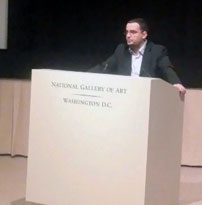 |
|||||||
|
|||||||||||
A discerning and appreciative American audience viewed digitally restored 35 mm prints of early Yuri Illienko films – “A Spring for the Thirsty” (1965), “The Eve of Ivan Kupala “(1968) on December 10 – and a difficult to watch but rewarding “Swan Lake – the Zone” (1990) on December 17 at the National Gallery of Art, on the occasion of the twentieth anniversary of Ukraine’s Independence. The retrospective screening of “Yuri Illienko: Ballad of Ukraine” film series was possible due to collaboration among the National Gallery, the Embassy of Ukraine, and the Washington Group Cultural Fund. Individuals, film historians, and teachers in the audience during the initial screening were privileged to ask questions and hear commentary from the film director’s son Pylyp. Americans wanted to know who owns the rights to films produced by the Soviet Dovzhenko Studios and what factors influenced the style of films produced there; Illienko’s incorporation of folk art, music, and colorization; funding for the rebirth of Ukrainian film production and distribution channels; notable films produced after Ukrainian independence that might interest American audiences, etc. The films not only unfold the everyday life of a Ukrainian family, but also concurrently interpret the historical fate of a nation. In the credits we notice that various Illienko family members participate in the earlier films along with local Cherkasy folk actors and Soviet prisoners in “the Zone.” The films are experimental and allegorical, changing from dream to reality, past to present. Sound recordings of traditional village music and visual stories are interspersed with harsh ambient sounds of modern Soviet repressive technology. Scenes of exploitation and repression of Ukrainian peasants during the periods of the Russian and Soviet Empires resonate with today’s youth who overflow auditoriums to learn about their suppressed history during screenings. Even in Ukraine today, Illienko’s message resonates in “that all the pure and bright things in this world are created by the pure hands of the people with a clean conscience. All the gains received by other means always bring unavoidable atonement, sooner or later.” Anonymous art film appreciator Note from the Ukrainian Film Club: wonderful and praiseworthy as this initiative was, it is both unfortunate and puzzling that the organizers chose to introduce the great Ukrainian filmmaker to the viewers under the Russian version of his family name Ilyenko rather than his original Ukrainian one Illienko. Though he grew up in Moscow, and spoke Russian as his mother tongue, Yuri Illienko considered himself Ukrainian and was passionate and uncompromising in his championship of the Ukrainian language.
|
|||||||||||
